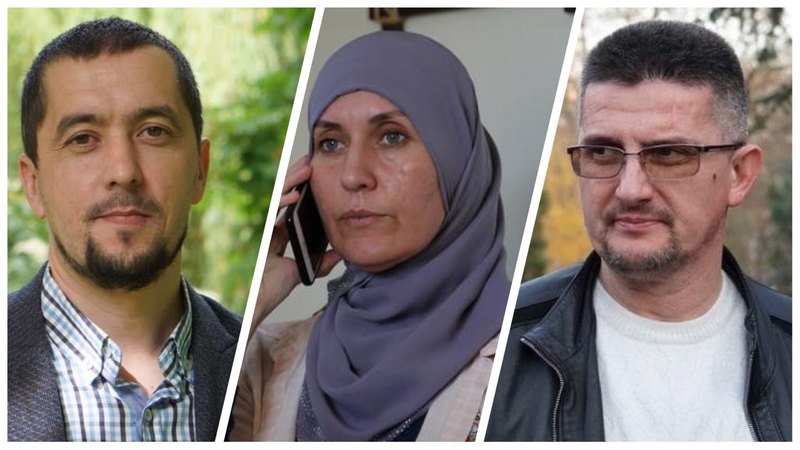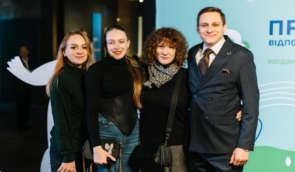Crimea Platform participants should react to arbitrary deprivation of Crimean lawyers’ professional status
While the main attention of the international community is focused on the large-scale atrocities of the Russian army in mainland Ukraine, gross violations of human rights in occupied Crimea cannot go unnoticed.
 Collage: Crimean Solidarity
Collage: Crimean SolidarityOn August 4, 2022, the Bar of the Chechen Republic deprived Lilia Hemedzhi, Rustem Kiamilev, and Nazim Sheikhmambetov of their lawyer status. According to the lawyers, the decision was made without actual notification of the meeting of a relevant qualification commission, and the lawyer status was terminated at the request of a government agency, not at the client’s complaint, as is usually the case in legal practice.
The decision means that Crimean lawyers are now unable to defend their clients in criminal cases and will not have the right to take the exam for re-acquisition of lawyer status within a year. As a result of the arbitrariness of the occupiers, at least 16 Crimean political prisoners may remain without proper legal assistance, including citizen journalists Server Mustafayev, Ruslan Suleymanov, Amet Suleymanov, and pro-Ukrainian activist Oleh Prykhodko.
Moreover, the deprivation of independent lawyers’ professional status against the background of intensified repression creates a threatening situation in occupied Crimea as any victim of human rights violations may find themselves without legal assistance. Instead, victims of political persecution may be provided with the services of a designated lawyer who works closely with the FSB or other occupation agencies. Such actions lead to a systematic violation of the right to a fair trial, which includes the right to defend himself/herself in person or through legal assistance of his/her own choosing and guaranteed by Art. 6 (3)(c) of the European Convention on Human Rights and Art. 14 (3)(d) of the International Covenant on Civil and Political Rights.
Depriving Lilia Hemedzhi, Rustem Kiamilev, and Nazim Sheikhmambetov of their lawyer status is not the first manifestation of systemic pressure on independent lawyers who defend victims of political repression in occupied Crimea. In January 2017, FSB officers searched the apartment of lawyer Emil Kurbedinov. In addition, Kurbedinov was twice placed under administrative detention on politically motivated charges in January 2017 and December 2018. In November 2021, lawyer Edem Semedliayev was fined and placed under administrative detention on politically motivated charges. In May 2022, four lawyers – Edem Semedliayev, Nazim Sheikhmambetov, Ayder Azamatov, and Emine Avamileva – were detained unlawfully. Later, Edem Semedliayev was again fined in a trumped-up administrative case, and three other lawyers spent several days under administrative detention.
Intimidation, pressure, and harassment of lawyers because of their professional activities are unacceptable. This practice runs counter to international standards and national legislation which establishes guarantees for representatives of legal professions. Arbitrary detention of lawyers grossly violates the Basic Principles on the Role of Lawyers, adopted by the Eighth United Nations Congress on the Prevention of Crime (1990), which guarantee the possibility of unhindered exercise of their powers by defenders (without intimidation, inappropriate interference and punishment for professional activity).
Ukrainian human rights organizations once again state that new forms of political repression in occupied Crimea and mass atrocities by Russian troops in mainland Ukraine could have been avoided if the international community had reacted more decisively to the Russian occupation of Crimea and the invasion of Donbas in 2014.
In the conditions of the Russian Federation’s many years of ignoring almost all norms of international law, the only way to stop arbitrariness and release political prisoners, prevent new war crimes, crimes against humanity, and gross violations of human rights in Crimea is the de-occupation of the peninsula with the help of existing diplomatic, sanction and legal measures, in particular the right to individual self-defense, provided for in Art. 51 of the UN Charter.
In this regard, we call on the governments of foreign states and international organizations, in particular, the participants in the International Crimea Platform to:
- strongly and jointly condemn the repression against lawyers in occupied Crimea
- impose restrictive measures on individuals involved in gross violations of human rights in occupied Crimea, including FSB employees, judges, investigators, heads of penitentiary facilities, etc.
- provide comprehensive support to victims of political repression in Crimea and their families
- continue to monitor and document human rights violations, war crimes, and crimes against humanity in occupied Crimea and include them in regular reports on the human rights situation in Ukraine
- assist the Government of Ukraine in investigating war crimes, crimes against humanity, and gross violations of human rights in occupied Crimea
- increase diplomatic, sanctions and other pressure on the Russian Federation to prevent new atrocities in Crimea and mainland Ukraine, as well as speed up the de-occupation of all territories of Ukraine
CrimeaSOS
Center for Civil Liberties
Human Rights Centre ZMINA
“Almenda” Civic Education Center
Human Rights Center “Action”
Advocacy Advisory Panel
Crimean Human Rights Group
Regional Center for Human Rights
Human Rights House Crimea
If you have found a spelling error, please, notify us by selecting that text and pressing Ctrl+Enter.















